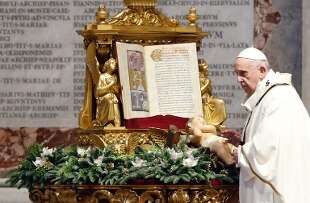Mass of the Epiphany in San Pietro (Ansa)
Pope: "It will be a happy new year if we love our neighbor: we need a heart vaccine"
Coronavirus.
Pope: "It pains me to see people who think about holidays and not those who suffer"
Te Deum, Pope Francis thanks those who helped in the pandemic
Share
January 06, 2021 "Adoring the Lord is not easy, it is not an immediate fact: it requires a certain spiritual maturity, being the point of arrival of an interior journey, sometimes long".
Indicating the attitude of the Magi as a model, Pope Francis thus began the homily of the Mass for the Epiphany, celebrated in St. Peter's Basilica in front of no more than eighty faithful due to anti-covid restrictions (and 25 cardinals ).
During the celebration, the date of Easter was announced: Sunday 4 April. The other liturgical celebrations have also been announced: Ash Wednesday (February 17) with the beginning of Lent; the Ascension of the Lord, on May 13; Pentecost, May 23; the first Sunday of Advent, 28 November.
It is not easy to worship God, the risk is idolatry
"The attitude of worshiping God is not spontaneous in us," he observed. "The human being needs to worship, yes, but he risks getting the wrong objective. In fact, if he does not worship God, he will worship idols, and instead of being a believer he will become an idolater", said the Pope. "Either God or idols" , he added 'off the cuff', "or, to use a French expression, whoever does not worship god worships the devil".
According to the Pontiff, "in our time it is particularly necessary that, both individually and as a community, we dedicate more time to adoration, learning ever better to contemplate the Lord". Begoglio then added: "Today, therefore, we go to the school of the Magi, to draw some useful lessons: like them, we want to bow down and adore the Lord".
The Pope, taking his cue from the readings, first invited us to "raise our eyes", to "put aside tiredness and complaints, to get out of the bottlenecks of a narrow vision, to free ourselves from the dictatorship of our own self, always inclined to fold in on itself himself and his own concerns ".
Never extinguish hope without pretending that everything is fine
"To worship the Lord you must first of all 'raise your eyes': that is, do not let yourself be imprisoned by inner ghosts that extinguish hope, and do not make problems and difficulties the center of your existence", the Pope explained. "This does not mean denying reality - he also said -, pretending or deluding oneself that all is well. It is a question of looking at problems and anxieties in a new way".
On the contrary, Francis added, "when we fix our attention exclusively on problems, refusing to raise our eyes to God, fear invades the heart and disorients it, giving rise to anger, bewilderment, anguish, depression. under these conditions it is difficult to worship the Lord ".
And it is "a new, different joy" that the disciple discovers in adoration, while "that of the world is founded on the possession of goods, on success or other similar things. Always 'I' at the center".
"Seeing beyond the veil of the visible"
The other attitudes indicated by the Pope are "setting out on a journey" - "travel always implies a transformation, a change. After a journey one is no longer the same" - and "seeing", in particular "beyond the veil of the visible, which often turns out to be deceptive".
And this way of "seeing" that "transcends the visible", "makes us adore the Lord, often hidden in simple situations, in humble and marginal people". "It is therefore - concluded the Pontiff - a gaze which, not letting itself be dazzled by the fireworks of exhibitionism, seeks on every occasion what does not pass".
"Even sins help us to grow"
"We become worshipers of the Lord through a gradual journey", and "from this point of view, failures, crises, errors can become instructive experiences: not infrequently they serve to make us aware that only the Lord is worthy of being worshiped. " Furthermore, the Pope continued in his homily, "with the passing of time, the trials and hardships of life - lived in faith - contribute to purifying the heart, making it more humble and therefore more open to God".
"Even sins - he added 'off the cuff' -, even the consciousness of being sinners, of finding such bad things, 'but I did this ...', if you take it with faith and repentance, with contrition, it will help you Everything helps, says Paul, to spiritual growth, to the encounter with Jesus, even sins, even sins. And St. Thomas adds, even mortals, even bad sins, the worst. But if you take it with you repentance will help you on this journey towards meeting the lord and worshiping him better. "
According to Pope Francis, "like the Magi, we too must allow ourselves to be instructed by the journey of life, marked by the inevitable difficulties of the journey. Let us not allow fatigue, falls and failures to throw us into discouragement. Recognizing them with humility, we must make them an opportunity to progress towards the Lord Jesus ".
"Life is not a demonstration of ability - he concluded -, but a journey towards the one who loves us. In every step of our life, we must not show the card of the virtues we have: with humility we must go towards the Lord".

